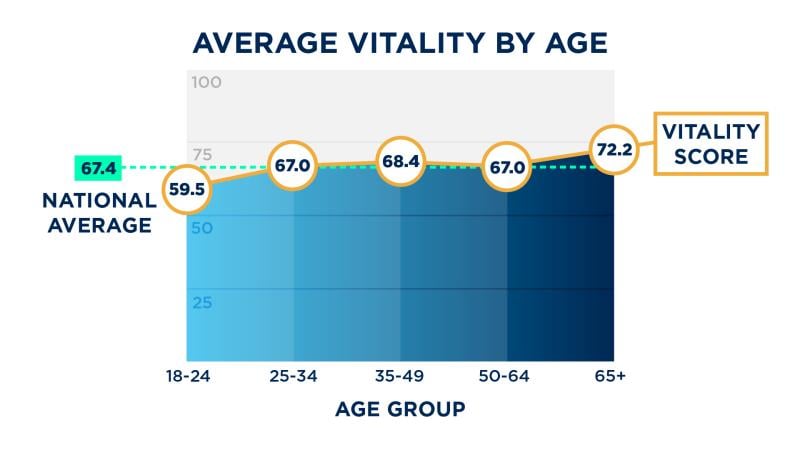Cigna's Evernorth has launched a new index aimed at tracking patients' vitality, which the company is touting as the "next-generation measure of health."
Evernorth said it's calculating vitality using eight elements of health: physical, spiritual, emotional, environmental, social, occupational, financial and intellectual. The index also accounts for how people feel about their own ability to manage their life across those factors, or their autonomy, relatedness and competence, Cigna said.
The company tasked Morning Consult with polling 10,000 adults between May and June of this year using the index and found that just 18% fell within a high level of vitality. Most people surveyed (67%) fell in the middle, and 15% were scored with low vitality.
Doug Nemecek, M.D., chief medical officer for behavioral health at Evernorth, told Fierce Healthcare that the findings show there's plenty of work to be done in improving whole-person health. Low vitality suggests that a person feels as though they have poor physical or emotional health and can negatively impact their performance at work.
"We see this connection both across an individual's sense of their own health all the way through work as well," Nemecek said.
Nearly half (43%) of people with low vitality described their own health as fair or poor, according to the survey. Adults with lower vitality were more likely to forego care or prescriptions due to cost, reported greater isolation, were more likely to have a chronic condition and were more likely to lack quality sleep habits, the survey found.
The youngest group included in the survey, aged 18 to 24, earned the lowest vitality scores, while people aged 65 and over earned the highest scores, according to the survey. People in the 25-to-34, 35-to-49 and 50-to-64 age groups were all on par with the national average score for vitality.

Evernorth's researchers said the low scores among Generation Z survey respondents highlight why looking at overall vitality means thinking beyond physical health. Gen Z adults were less likely to be obese or have a chronic condition, but many faced a "crisis of competence" in managing their lives that takes a toll on their mental health. Nearly a third (32%) were diagnosed with or receiving treatment for clinical depression or anxiety, compared to 21% on average in the general population.
Nemecek said that Cigna's previous survey work on loneliness also identified that Gen Zers were feeling more lonely than older adults.
"We've seen that carry through with the vitality survey," he said.
He said the data should drive focus on helping this age group improve their mental health, which could lead to better work performance and a greater sense of community.
The survey also found that people with lower incomes tend to score lower on the vitality index, as did women and members of the LGBTQ+ community, particularly, again, among the youngest people surveyed.
Addressing these challenges and continuing to build on this data is a key focus at Cigna, Nemecek said, and the company is going to looking for ways to improve vitality both commercially and in partnership with community organizations.
"We're just getting started, to some degree, on this journey," he said. "This is really built into our overall goals over the next several years."